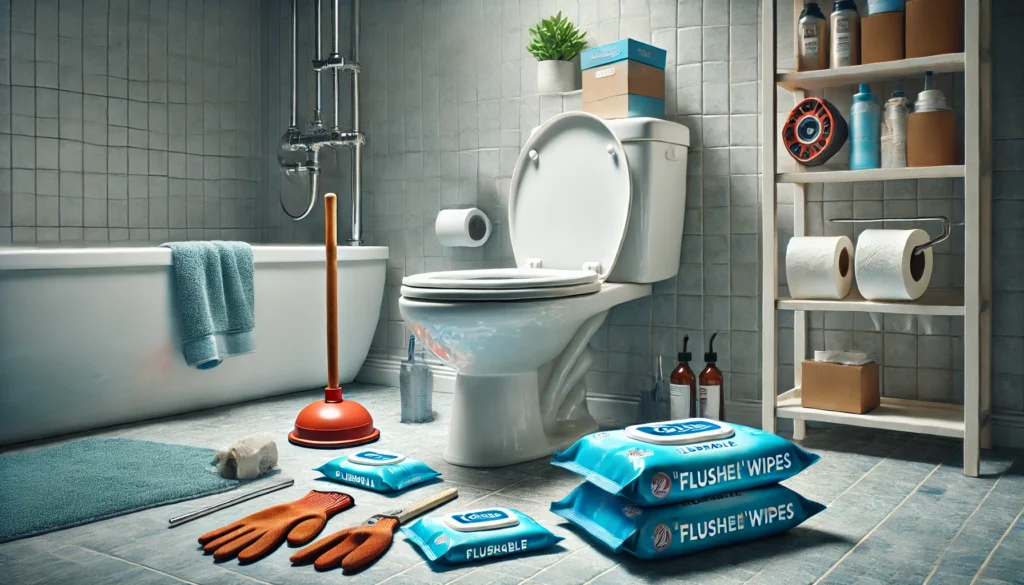
The Real Impact of ‘Flushable’ Products on Your Plumbing System

The convenience of “flushable” products has made them increasingly popular for households, but their effect on plumbing systems tells a different story. Despite being marketed as flushable, many of these products can wreak havoc on your pipes and sewer systems, leading to costly repairs and environmental issues. This article explores the truth about “flushable” wipes and similar products, helping you make informed choices for your home and plumbing system.
What Are ‘Flushable’ Products?
‘Flushable’ products include items like wipes, sanitary products, and biodegradable paper alternatives designed to be disposed of via your toilet. While these items claim to break down easily in water, many fail to meet the same disintegration standards as toilet paper.
Common Examples:
- Personal care wipes (baby wipes, makeup remover wipes).
- Cleaning wipes.
- Feminine hygiene products labelled as flushable.
Why ‘Flushable’ Products Are a Problem
1. They Don’t Break Down Quickly
Unlike toilet paper, which disintegrates almost immediately in water, many ‘flushable’ wipes take significantly longer to break down. This increases the likelihood of clogs in your pipes.
Impact:
- Blocked toilets and drainpipes.
- Build-up of materials in septic tanks.
- Increased strain on wastewater treatment facilities.
2. They Contribute to Fatbergs
When flushed wipes combine with fats, oils, and grease (FOG) in sewer systems, they create large blockages known as fatbergs. These massive obstructions can cause significant damage to public sewer systems.
Impact:
- Expensive and time-consuming removal processes.
- Sewer overflows that pollute local waterways.
3. Misleading Labelling
While these products may technically be flushable, many don’t comply with the same rigorous standards as toilet paper. This can lead to confusion among consumers, who assume these products are safe for plumbing systems.
Impact:
- Increased risk of costly plumbing repairs for homeowners.
- Greater environmental harm from improper disposal.
Signs of Plumbing Problems Caused by Flushable Products
- Slow Draining Water: A partial blockage may restrict the flow in your pipes.
- Frequent Clogs: Repeated use of a plunger may indicate a deeper issue.
- Gurgling Sounds: Air trapped in the pipes due to blockages can create unusual noises.
- Sewer Backups: Severe blockages can cause waste to backflow into your home.
If you notice any of these signs, contact a plumber immediately to prevent further damage.
How to Avoid Plumbing Issues from ‘Flushable’ Products
1. Stick to Toilet Paper Only
Toilet paper is specifically designed to dissolve quickly in water, making it the safest option for your plumbing.
2. Dispose of Wipes in the Bin
Even if labelled flushable, dispose of wipes in the rubbish bin to prevent blockages. Keep a small, lined bin in your bathroom for convenience.
3. Educate Your Household
Ensure everyone in your home knows what can and cannot be flushed. Simple rules can prevent costly mistakes.
4. Use Drain Strainers
Install strainers on your drains to catch debris and prevent clogs caused by foreign materials.
Environmental Impacts of ‘Flushable’ Products
The damage caused by these products extends beyond plumbing systems to the environment. Non-biodegradable wipes contribute to marine pollution, harming aquatic ecosystems and wildlife. Additionally, the increased burden on wastewater treatment facilities leads to higher energy use and emissions.
Did You Know?
The UK water industry spends £100 million annually clearing blockages caused by inappropriate flushing, much of which is passed on to customers through higher bills.
What Can You Do?
- Choose Certified Products: Look for items certified as safe for plumbing and septic systems, such as those meeting Fine to Flush standards in the UK.
- Advocate for Better Labelling: Support regulations requiring clear, honest labelling for so-called ‘flushable’ products.
- Reduce Waste: Use reusable alternatives like cloth wipes or biodegradable options that don’t need to be flushed.
Protect Your Plumbing and the Environment
While ‘flushable’ products may seem convenient, their long-term impact on plumbing systems and the environment outweighs their benefits. By making mindful choices and educating those around you, you can help protect your home from costly repairs and contribute to a healthier planet. Keep it simple: if it’s not toilet paper, it doesn’t belong in the toilet.